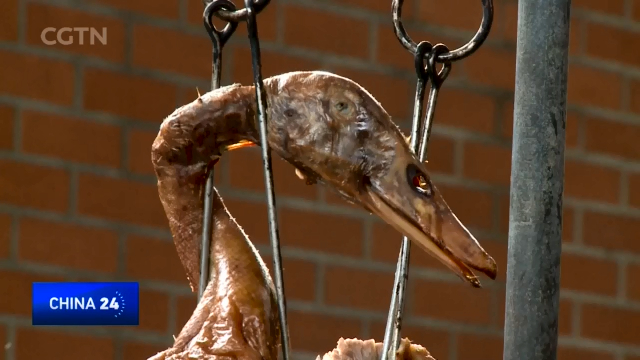
21:04, 13-Jul-2018
Asian Cuisine in Caracas: Overseas communities adding new spice to Venezuela's capital
Updated
20:29, 16-Jul-2018
02:24

The smell of Peking Duck and Sichuan Chili Chicken is filling the streets of Venezuela's capital. A large Asian community calls Caracas home and natives have a growing appetite for their favorite foods. CGTN's Juan Carlos Lamas has more.
Every Sunday from 5am until noon, much of Caracas' Asian population gathers here to sell everything from raw eel to cooked duck. It's a market that specializes in traditional Asian foods that can be otherwise hard to find in Venezuela.
SIUJIA FENG CARACAS RESIDENT "Our country is very far away from here, and this market represents a piece of our land - it is like being in China."
Chinese, Japanese, Korean and Venezuelan communities come together to buy ingredients not commonly found in Latin America.
ALEJANDRO AU MA CARACAS RESIDENT "This is the only place in Caracas where we can find some Asian foods that we use in our cuisine. So most of the vegetables that we find here cannot be found anywhere else in the city."
Nearly all the fruits and vegetables here have been grown in Venezuela. But other, more specialized items like soy sauce and several snacks come straight from China. Due to Venezuela's cash shortage, most payments are done through bank transactions.
JUAN CARLOS LAMAS CARACAS "U.N. figures show Venezuela has the third largest Chinese population in Latin America, behind Brazil and Argentina. And it's at the market that some of the country's 14-thousand Asian people get a chance to share their food and their traditions with the Venezuelan people."
Many locals here say Asian tastes have had an enormous impact on Venezuela's cuisine.
CARLOS IRIARTE CARACAS RESIDENT "This is something different, they have a wide range of products which is something you don't see in Venezuelan markets."
And many Venezuelans have enthusiastically embraced Asian flavors. But Venezuela's economic crisis has hit the Chinese market, too. The number of buyers and sellers has decreased over the last three years. Still, this community is working hard to keep the market open, their products on sale, and their traditions alive for future generations. Juan Carlos Lamas CGTN Caracas.

SITEMAP
Copyright © 2018 CGTN. Beijing ICP prepared NO.16065310-3
Copyright © 2018 CGTN. Beijing ICP prepared NO.16065310-3